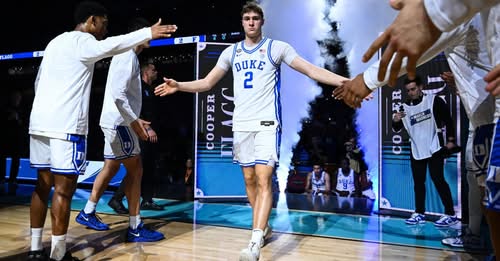From the moment they step onto the court at Cameron Indoor Stadium, Duke freshmen are expected to carry not just the hopes of their team, but the weight of a program that defines excellence in college basketball. For decades, the Blue Devils have been a beacon of talent development, and many of their greatest stars made an impact from day one. Whether leading deep tournament runs, rewriting record books, or becoming national household names before their sophomore year, Duke’s best freshmen have shaped the landscape of college hoops. And now, with the arrival of Cooper Flagg—the most hyped recruit since LeBron James—the conversation about the greatest freshman in program history has reopened.
Cooper Flagg has yet to play a regular-season game, but the buzz is undeniable. The 6-foot-9 phenom from Maine arrived with a level of anticipation unseen since Zion Williamson’s explosive debut in 2018. A defensive menace, shot-blocking savant, and offensive catalyst with elite court vision, Flagg dominated summer sessions and overseas scrimmages, earning praise from NBA scouts and drawing comparisons to generational talents. His presence alone has propelled Duke into the national title conversation before the first tip-off. And while his story is still being written, Flagg has already forced his name into the upper echelon of Duke’s all-time freshman rankings.
Still, Flagg enters a pantheon crowded with greatness. Zion Williamson was a spectacle unlike any other. In 2018-19, he didn’t just dominate—he transcended the sport. With viral dunks, impossible agility, and brute strength packed into a 285-pound frame, Zion averaged 22.6 points, 8.9 rebounds, 2.1 steals, and 1.8 blocks per game while shooting 68% from the floor. His performance against Virginia—highlighted by a jaw-dropping chasedown block—became symbolic of his reign. Despite injuries, Williamson’s impact on and off the court made that Duke squad appointment viewing every night. Alongside RJ Barrett and Cam Reddish, he powered Duke to the Elite Eight before a narrow loss to Michigan State. That season, Zion swept nearly every major national award and remains the most unforgettable one-and-done in program history.
Kyrie Irving played just 11 games in a Duke uniform due to a toe injury, but what he displayed in that short span was enough to cement his legacy. He averaged 17.5 points and 4.3 assists in that abbreviated stretch and returned just in time for the NCAA Tournament. His performance in those games—especially a 28-point effort against Arizona in the Sweet 16—was a reminder of what could’ve been. Though his career in Durham was brief, Irving’s natural scoring ability and advanced skill set forecasted NBA superstardom. Even in a small sample, he made an undeniable impression.
Jabari Parker’s lone year at Duke in 2013-14 saw him become the first freshman to lead the team in scoring and rebounding since Johnny Dawkins. Parker averaged 19.1 points and 8.7 rebounds per game, showcasing polished post moves, a soft shooting touch, and the ability to stretch defenses. He was the focal point of Mike Krzyzewski’s offense and earned First-Team All-American honors. Though his season ended in an upset loss to Mercer in the NCAA Tournament, Parker’s consistent excellence across the year made him one of Duke’s most productive first-year players ever.
Another name who deserves prominent recognition is Marvin Bagley III. The high-flying power forward joined Duke in 2017-18 and instantly dominated. Averaging 21 points and 11.1 rebounds per game, Bagley earned ACC Player of the Year honors as a freshman—an honor few underclassmen have ever achieved. His chemistry with Wendell Carter Jr. made Duke’s frontcourt virtually unguardable. Though the Blue Devils fell short in the Elite Eight, Bagley’s double-double machine performance and his record-setting 22 double-doubles as a freshman left a massive mark.
Brandon Ingram’s lone season at Duke in 2015-16 showcased his versatile offensive toolkit. Standing at 6-foot-9 with a 7-foot-3 wingspan, Ingram displayed a smooth shooting stroke, defensive flexibility, and star-level poise. He averaged 17.3 points and 6.8 rebounds per game, often playing the role of closer in tight contests. His ability to handle the ball, shoot from deep, and guard multiple positions made him a matchup nightmare. Despite being overshadowed in media hype by Ben Simmons that year, Ingram steadily carved out a memorable campaign.
Luol Deng, though often overlooked in the one-and-done era, was a standout freshman during the 2003-04 season. He averaged 15.1 points and 6.9 rebounds, helping lead Duke to the Final Four. His versatility, mid-range prowess, and defensive discipline made him a key contributor alongside veterans like J.J. Redick and Chris Duhon. In a time when freshmen were rarely expected to star immediately, Deng broke the mold.
Austin Rivers had his moments of brilliance, particularly his buzzer-beating dagger to beat North Carolina in Chapel Hill. The son of NBA coach Doc Rivers, Austin averaged 15.5 points per game and played with fearless confidence. Though his decision-making could be erratic at times, Rivers provided some of the most electric moments in recent Duke history, and his game-winner at the Dean Dome remains iconic.
Jahlil Okafor’s 2014-15 campaign deserves special attention because it led to a national title. The 6-foot-11 big man averaged 17.3 points and 8.5 rebounds per game and served as the offensive anchor for a team that included fellow freshmen Tyus Jones and Justise Winslow. Okafor’s footwork, soft hands, and low-post dominance gave Duke an identity in the paint, and his consistency throughout the NCAA Tournament helped the Blue Devils win their fifth national championship. While Okafor wasn’t a shot-blocker or dominant defender, his offensive prowess made him one of the best low-post threats in the nation.
Tyus Jones, though not as statistically dominant as some of his peers, provided poise and leadership beyond his years. As a freshman point guard, he orchestrated Duke’s offense with precision, averaging 11.8 points and 5.6 assists. His most iconic moment came in the 2015 National Championship game against Wisconsin, where he poured in 23 points, including several clutch shots late. Jones won the Final Four Most Outstanding Player award, a rare feat for a freshman point guard, and etched his name into Duke folklore through leadership and late-game heroics.
RJ Barrett was a statistical monster during his one season in Durham. Averaging 22.6 points, 7.6 rebounds, and 4.3 assists per game, Barrett often carried Duke in crucial moments. While Zion got most of the spotlight, Barrett was the engine, leading the team in scoring and bringing a competitive edge that bordered on ruthless. His all-around game and relentless motor made him one of the best all-around freshmen to ever wear a Duke uniform.



